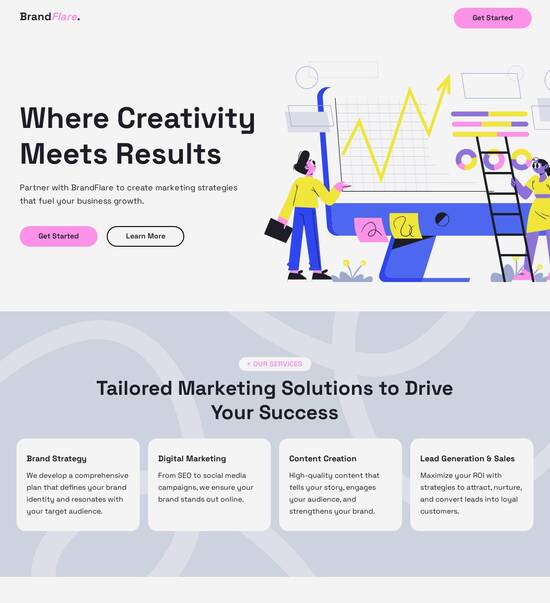
Bootstrap optimized help center page template
Explore Similar TemplatesAbout template
Supercharge your help center page with Bootstrap for outstanding performance! Learn more today.
Recommended templates

Easy to build without coding
With the intuitive drag-and-drop builder, anyone on your team can create high-converting pages without any knowledge of code or design. Make enhancements to your landing page with custom widgets using Javascript, HTML/CSS, or third-party scripts.

Multiple layouts for any industry and goal
Select from 500+ landing page layouts built to boost conversions across industry-specific scenarios. Customize them by adjusting fonts, adding images, and generating on-brand content with the AI assistant. Quickly scale with Instablocks® and Global Blocks that you can save, reuse, and update globally.

Loads fast and looks polished on any device
Every template is responsive, which means they present professionally on any device and load blazingly fast with our Thor Render Engine. You can also power them up with Google AMP technology to deliver an unparalleled mobile experience and drive higher conversions.

Robust analytics & experimentation
Get real-time updates and reporting across all your devices, showing the number of visitors, conversions, cost-per-visitor, and cost-per-lead. Launch AI-powered experiments, run A/B tests, and use heatmaps to analyze user behavior, then optimize your landing page to maximize conversions.







Easy to build without coding
With the intuitive drag-and-drop builder, anyone on your team can create high-converting pages without any knowledge of code or design. Make enhancements to your landing page with custom widgets using Javascript, HTML/CSS, or third-party scripts.
Multiple layouts for any industry and goal
Select from 500+ landing page layouts built to boost conversions across industry-specific scenarios. Customize them by adjusting fonts, adding images, and generating on-brand content with the AI assistant. Quickly scale with Instablocks® and Global Blocks that you can save, reuse, and update globally.
Loads fast and looks polished on any device
Every template is responsive, which means they present professionally on any device and load blazingly fast with our Thor Render Engine.
Robust analytics & experimentation
Get real-time updates and reporting across all your devices, showing the number of visitors, conversions, cost-per-visitor, and cost-per-lead. Launch AI-powered experiments, run A/B tests, and use heatmaps to analyze user behavior, then optimize your landing page to maximize conversions.
All the features you need to build lead-generating landing pages
Explore more featuresLearn how to build top-performing landing pages for any goal
FAQs
Leading the way in building high-performing landing pages





A comprehensive guide on leveraging Instapage for effective landing pages
Instapage is recognized as the leading landing page and conversion rate optimization (CRO) platform, tailored to empower marketers to enhance and scale their digital marketing efforts effectively. This guide will walk you through how to utilize Instapage to maximize your ROI through optimized landing pages.
Understanding the power of landing pages
Landing pages are pivotal in guiding potential customers toward taking action, whether signing up, purchasing or learning more. Instapage provides over 100 customizable templates that cater to diverse industries, making it easy to create high-converting pages.
- Customization options: Easily tailor templates to reflect your brand's identity and messaging.
- Conversion-focused designs: Use layouts that are proven to increase engagement and lead capture.
- User-friendly interface: Create landing pages without needing technical expertise, enabling faster deployment.
Step 1: Crafting your first landing page
Creating your initial landing page with Instapage is simple. Here's a step-by-step guide to get started.
- Choose a template: Browse through Instapage's extensive library to find a template that fits your campaign's needs.
- Customize the content: Use the easy drag-and-drop builder to add your text, images, and call-to-action (CTA). Ensure your messaging is consistent with your ad campaigns.
- Publish and test: Once your page is ready, publish it and utilize A/B testing features to determine which variants drive the best conversion rates.
Step 2: Optimize for performance
After launching your landing page, it's crucial to optimize it for the best results. Here are some strategies:
- A/B Testing: Regularly test different headlines, images, and CTAs to see what resonates best with your audience.
- Heatmaps: Utilize Instapage's heatmaps to analyze user behavior on your pages, allowing for better decision-making on layout adjustments.
- Analytics Dashboard: Monitor key metrics to measure the effectiveness of your pages and refine your strategy based on data-driven insights.
Step 3: Personalize user experiences
Personalization can significantly enhance engagement on your landing pages. Consider the following:
- Dynamic Text Replacement: Tailor your messaging based on the source of the traffic to maintain relevance.
- AdMaps: Align your ads directly with specific landing pages, ensuring visitors get a consistent message throughout their journey.
- Audience segmentation: Use data tools to track audience behaviors and preferences, refining your marketing to cater to their specific needs.
By following these steps, you can maximize the impact of your landing pages and drive higher conversion rates.
Ready to transform your digital marketing campaigns with Instapage? Start crafting high-converting landing pages today!
People also ask about Bootstrap optimized help center page template
Bootstrap optimized help center page template
Understanding Bootstrap: A framework for modern design
Bootstrap is a popular front-end framework originally developed by Twitter to streamline web development. Since its inception, Bootstrap has evolved significantly, gaining a robust community and extensive documentation. Its key features include a responsive grid system, pre-designed components, and JavaScript plugins, making it an essential tool for developers aiming to create functional and visually appealing websites.
The relevance of Bootstrap in designing help center pages cannot be overstated. Help centers often need to cater to diverse audiences across various devices. With Bootstrap, developers can easily create responsive designs that adapt to different screen sizes. This capability not only enhances usability but also ensures that users can access vital support information quickly and efficiently.
The structure of an optimized help center page template
An optimized help center page typically includes several core elements. Common sections often feature FAQs, a search bar, contact options, and links to community forums. These sections are crucial for guiding users to find the information they need without frustration. Additionally, design components such as headers, footers, and navigation menus should be intuitive, allowing for seamless transitions throughout the page.
Utilizing the Bootstrap grid system can significantly impact the layout of these core elements. The grid allows for flexible arrangements of content across different screen sizes by employing rows and columns. For instance, FAQs can be displayed in a two-column layout on larger screens and switch to a single-column format on mobile devices, ensuring that information remains accessible and easy to read.
Enhancing user experience through design choices
Prioritizing user needs during the design phase is essential for a help center's effectiveness. Understanding typical user inquiries can inform the layout and content presented. Providing a robust search functionality allows users to quickly locate answers to their questions. A well-designed search bar encourages keyword entry, which enhances the chances of delivering relevant content promptly.
Visual hierarchy plays a critical role in organizing content clearly. By effectively utilizing headings, bullet points, and spacing, designers can significantly improve readability. For example, important information like contact details can be highlighted in bold or larger font sizes, ensuring users can identify key messages at a glance.
Creating responsive designs across devices and screen sizes
Mobile optimization is critical, especially as statistics indicate that a significant percentage of support queries originate from mobile devices. Designing help center pages with mobile users in mind ensures broader accessibility. For instance, touch-friendly elements and larger clickable areas can greatly enhance the experience for mobile users, allowing them to navigate easily.
Adaptive design techniques, such as implementing CSS media queries, allow designers to create a seamless experience across various devices. By adjusting the layout, font sizes, and images according to the screen size, users can enjoy a consistent experience, regardless of how they access the help center. This adaptability fosters user satisfaction, encouraging customers to return.
Customizing content for diverse user groups
Personalizing user assistance through tags and categories can streamline navigation. By tagging content relevant to specific topics, users can filter results more efficiently. This strategy is particularly useful in a help center where users may seek assistance on varied subjects, allowing them to find the information they need faster.
Incorporating interactive components, such as chatbots and live chat features, can significantly enhance user engagement. These tools provide real-time responses to user inquiries, reducing wait times and increasing satisfaction. Additionally, including sections for user feedback creates an opportunity for continuous improvement, as collecting insights from actual users can guide future updates and revisions.
Advanced features to elevate help pages
Integrating a search functionality is vital for making help easy to find. Bootstrap offers various components that can help create an efficient search bar. Developers can use features like auto-suggest and filter options to enhance the search experience, ensuring users can access the most relevant results quickly.
Utilizing multimedia, such as videos and tutorials, can enrich the help center experience. By embedding clear visual content, users can better understand processes or solutions. Effective tutorial structures, complete with step-by-step guidance and visuals, can significantly assist users in navigating complex issues, providing support that resonates with their learning preferences.
The role of analytics in optimizing help center performance
Tracking user interaction and feedback through analytics tools is vital for understanding how the help center performs. Collecting data on user engagement helps identify which sections are most frequently accessed and which might need more attention. Critical metrics, such as the number of successful searches or time spent on particular pages, provide insight into overall user satisfaction.
Continuous improvement can be achieved by iterating the help center based on user behavior. Analyzing collected data allows developers to identify pain points and enhance the website experience. Real-world case studies highlighting successful iterations can serve as inspiration, shedding light on effective strategies for evolution.
Best practices for maintaining a bootstrap help center page
Regular updates and content maintenance are essential for ensuring the help center remains relevant. Outdated information can frustrate users seeking timely support. Tactics such as scheduled reviews of content and features help keep the help center fresh and aligned with evolving user needs, enhancing the overall experience.
Accessibility considerations should also be prioritized in help center design. Following established guidelines ensures usability for all users, including those with disabilities. Implementing accessibility best practices within Bootstrap frameworks, such as proper labeling for screen readers, can effectively broaden the help center's reach and improve user satisfaction.
The future of help centers: trends and innovations
Emerging technologies, particularly artificial intelligence and machine learning, have the potential to refine user experiences in help centers. These technologies can offer personalized content and anticipate user needs by analyzing behavior patterns. Future design trends may increasingly focus on natural language processing within search functionalities, making it easier for users to ask questions in everyday language.
Community engagement will also play a significant role in shaping the future of help centers. User-generated content, such as forums and discussion boards, fosters a supportive environment for users to share knowledge and solutions. Strategies that promote collaboration, such as incentivizing users to contribute, will help cultivate a vibrant community that thrives on shared support.
Ready to skyrocket conversions?
Supercharge your ad campaigns with high-performing landing pages
Get started














